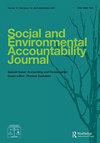反腐败会计:社会与环境会计学者在哪里?
Q2 Business, Management and Accounting
Social and Environmental Accountability Journal
Pub Date : 2022-09-02
DOI:10.1080/0969160X.2022.2146151
引用次数: 2
摘要
会计与腐败存在着一种紧张的关系,会计要么是腐败的解决方案,要么是腐败的帮凶。会计研究的不同领域已经检查了这种关系的双方,但社会和环境会计(SEA)奖学金远远落后。这是不幸的,因为腐败对社会和自然环境有可怕的影响。这篇评论邀请东南亚的学者来阐明会计、腐败和可持续性之间错综复杂的联系。为了支持我的论点,我解释了为什么腐败对SEA很重要,并回顾了之前研究这两个领域交叉的研究。在现有的腐败会计研究的基础上,我认为未来的研究应该探索新的公共管理(NPM)类型的反腐败改革对社会和环境议程的影响。我坚持认为,在使用NPM实践时,应根据当地情况进行调整。我还提出了一个案例,探讨当地知情会计实践的潜力,以遏制影响可持续性实践的腐败。本文章由计算机程序翻译,如有差异,请以英文原文为准。
Accounting for Anticorruption: Where Are the Social and Environmental Accounting Scholars?
ABSTRACT Accounting and corruption exist in a tense relationship in which accounting is either the solution to or an accomplice of corruption. Diverse areas of accounting research have examined both sides of this relationship, but social and environmental accounting (SEA) scholarship has lagged well behind. This is unfortunate, as venality has dreadful impacts on society and the natural environment. This commentary invites SEA scholars to shed light on the intricate bonds between accounting, corruption and sustainability. To support my argument, I explain why corruption matters to SEA and review prior studies that examine the intersection of these two areas. Building on extant accounting research on corruption, I argue that future research should explore the effects of the new public management (NPM) type of anticorruption reforms on the social and environmental agenda. I maintain that, when used, NPM practices should be adapted to local settings. I also make a case for exploring the potential of locally informed accounting practices to curb corruption that affects sustainability practices.
求助全文
通过发布文献求助,成功后即可免费获取论文全文。
去求助
来源期刊

Social and Environmental Accountability Journal
Business, Management and Accounting-Accounting
CiteScore
3.90
自引率
0.00%
发文量
16
期刊介绍:
Social and Environmental Accountability Journal (SEAJ) is the official Journal of The Centre for Social and Environmental Accounting Research. It is a predominantly refereed Journal committed to the creation of a new academic literature in the broad field of social, environmental and sustainable development accounting, accountability, reporting and auditing. The Journal provides a forum for a wide range of different forms of academic and academic-related communications whose aim is to balance honesty and scholarly rigour with directness, clarity, policy-relevance and novelty. SEAJ welcomes all contributions that fulfil the criteria of the journal, including empirical papers, review papers and essays, manuscripts reporting or proposing engagement, commentaries and polemics, and reviews of articles or books. A key feature of SEAJ is that papers are shorter than the word length typically anticipated in academic journals in the social sciences. A clearer breakdown of the proposed word length for each type of paper in SEAJ can be found here.
 求助内容:
求助内容: 应助结果提醒方式:
应助结果提醒方式:


